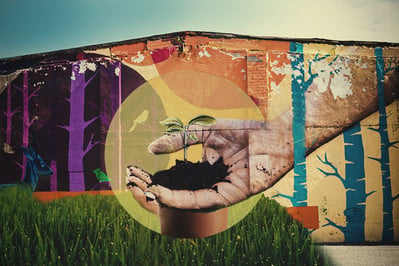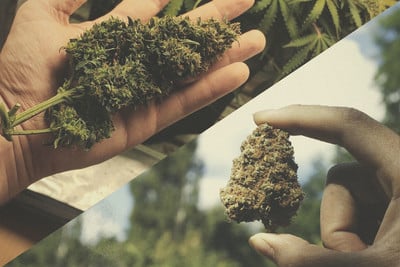.

How to Use Baking Soda When Growing Weed
You might not believe it at first, but baking soda could be a worthy addition to your cannabis cultivation arsenal. This simple solution can help to raise pH, fight off powdery mildew, defend against pests, and even wash buds post-harvest. But there are some potential risks as well, if applied incorrectly. Find out everything you need to know.
Spraying weed with baking soda? This might sound preposterous, but let us explain! Sure, baking soda has important uses in cooking and household cleaning, but it also comes in handy in the garden. Baking soda solutions are effective at combating certain diseases and pests, and can also help to modulate pH. Furthermore, baking soda can be used post-harvest to prepare your buds for use. However, on all accounts, you need to exercise caution. Apply too much, or administer at the wrong time, and you can really mess things up.
Contents:
What Is Baking Soda?
Baking soda, otherwise known as bicarbonate soda, is a key ingredient in various types of bread, batter, and more. As a base (alkaline substance), baking soda has a pH of 9.5. The ingredient reacts with acidic ingredients, such as vinegar and buttermilk, to create carbon dioxide. This gas then forms the bubbles that cause breads and batters to rise during the baking process.
While baking soda is undeniably useful when making certain foods, its alkaline pH makes it useful in other areas too.
In the realm of hygiene, you’ll find the substance in natural toothpaste and mouthwashes. Moreover, baking soda is used as an antacid to counter the acidity of stomach acid in cases of heartburn. Those wishing to avoid harsh chemical cleaning products also rely on baking soda as a scouring powder, drain cleaner, and carpet deodoriser.
Of course, baking soda also comes in handy as a natural garden input to combat certain pests and diseases and remediate pH issues.

Why Use Baking Soda in Your Cannabis Garden?
If somebody told you to douse your cannabis plants with a baking soda foliar spray, how would you react? We totally get it if you’d laugh, shake your head, and disregard that as poor advice. As ridiculous as it sounds, baking soda actually serves as an effective cultivation solution under the right conditions, and when applied at the correct time. Below, we’ll walk you through some of the best uses for baking soda in your cannabis garden. Plus, we’ll also suggest times to avoid using it, such as later on in the flowering stage.
How Do You Apply Baking Soda to Plants?
As a versatile substance in a cultivator’s arsenal, baking soda can be applied as a diluted foliar spray or used directly in the soil. Furthermore, it can be used post-harvest to help remove contaminants from your buds (more on this below).
Baking Soda as a Fungicide and Pesticide
Various fungal pathogens infect cannabis plants, drawing out nutrients to ensure their own survival. Among them, powdery mildew stands as one of the most common and damaging. As well as fungal disease, pests pose one of the biggest threats to cannabis gardens and grow rooms. Left unchecked, certain species make quick work of entire canopies. Among the most common cannabis pests, aphids are able to inflict significant damage. Their sharp mouthparts enable them to pierce plant tissue and extract the nutrient sap within, and their ability to multiply by cloning themselves rapidly makes them difficult to combat when they gain a foothold.
However, depending on the scale of your problem—whether fungal or pest-related—simple and effective solutions do exist. Instead of reaching for a bottle of harsh chemical pesticides that can negatively impact your garden and the environment beyond, why not put baking soda on your weed?
Basic Baking Soda Foliar Spray Recipe
Thankfully, a cheap and simple baking soda solution can help to combat the infection or infestation and give your plant a good chance of recovering. Make your own using the directions below.
Note: baking soda has a strong effect on pH, even when applied as a foliar spray, so err on the side of over-diluting. If you see any signs of stress, such as leaf curling or discoloration, immediately cease use, and douse leaves in fresh water.
Ingredients• Baking soda |
Equipment• 5l bottle |
Directions
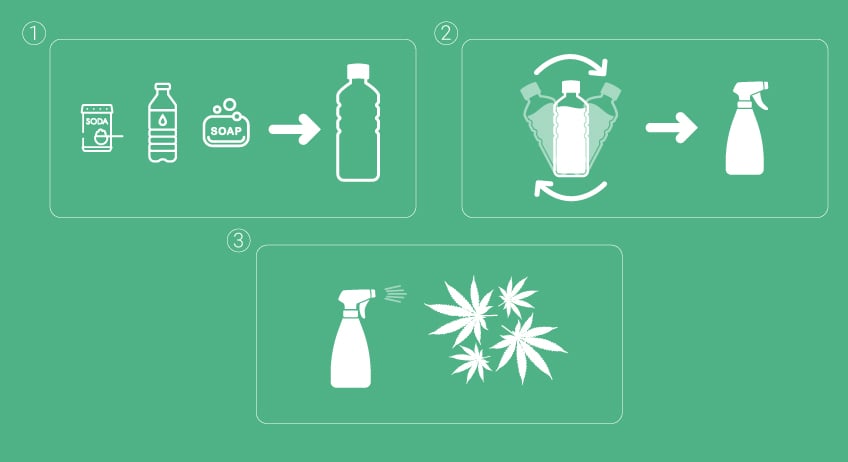
1. Start by mixing 4.5l of water, 1 tablespoon of baking soda, and ½ teaspoon of soap in the 5l bottle.
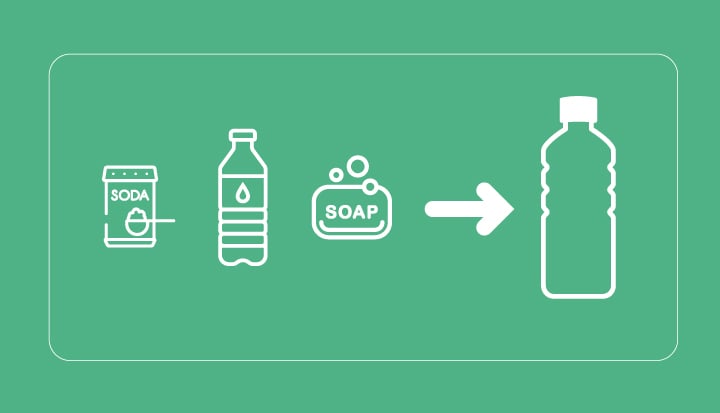
2. After mixing thoroughly, transfer some of the solution into your spray bottle.

3. Administer the solution on the foliage during overcast days to avoid leaf burn. Apply generously on both sides of affected fan leaves and stems.
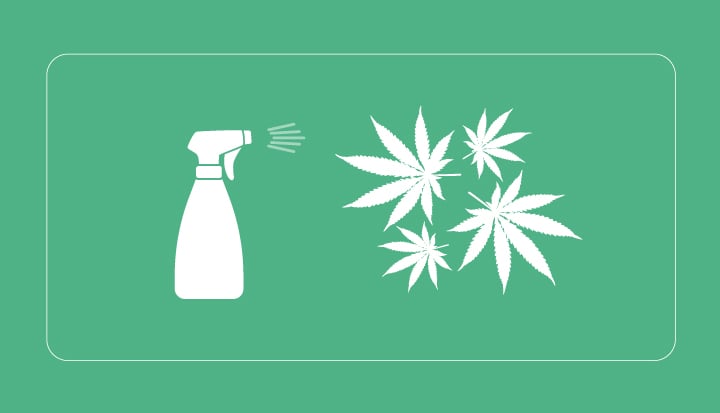
The baking soda works well alone, but the addition of the soap really improves the effectiveness of the spray. Simply patrol your garden or grow room and apply as necessary.
As briefly mentioned above, foliar application of baking soda is only recommended during the vegetative and pre-flowering phases. Applying this solution during mid and later flowering can cause residual buildup on your buds.

Use Baking Soda (Carefully) to Increase pH
Should you put baking soda in soil? If used in the right circumstances, it can help to manage pH. Cannabis growers need to remain mindful of soil pH throughout the cultivation process; when levels are too low or too high, plants cannot uptake crucial nutrients.
If you find your soil tests too acidic, you can apply baking soda to raise the level to the sweet spot of between 6.0 and 7.0. To pull this off, mix a tablespoon of baking soda into 5 litres of water and use as needed. Start off small, depending on your container size, and measure pH again several hours after administration. Continue to use the solution, after testing your soil, to keep pH within the desired range. Again, baking soda has a dramatic effect on pH, so be thoughtful when administering. Start off too keen, and you could seriously throw off the pH, worsening the issue rather than solving it.
Baking Soda During Bud Washing
The idea of bud washing may seem absurd to some, much like the idea of spraying weed with baking soda; however, many cultivators use this process to rid their buds of various contaminants, potentially improving their flavor as well. As cannabis trichomes are very sticky, many different kinds of particles can cling to the buds, including soil, dust, insect eggs and excrement, and cobwebs—you can’t tell us you want any of that in your lungs!
During the process of bud washing, baking soda, lemon juice, and fresh water are used as the cleansing solution, after which the buds are rinsed in two buckets of fresh water to ensure nothing residual remains. The combination of baking soda and lemon juice works to remove the particles you don’t want on your weed, while maintaining the integrity of the trichomes.
Does Baking Soda Have a Place During the Flowering Phase?
Should you start spraying buds with baking soda? We don’t advise it, past a certain point. You’ll need to elect to use different strategies to combat pests and disease past week two of the flowering stage. Apply baking soda sprays any later, and you’ll end up with buds that taste undesirable.
But what about the use of baking soda during bud washing? Well, washing your buds in a weakly diluted solution doesn’t compare to spraying sticky flowers directly with baking soda, which can prove much more difficult to remove prior to drying, curing, and smoking.
Baking Soda on Weed: Wise or Foolish?
Baking soda can provide home growers with a cheap and easy way to eliminate certain pests and diseases. The substance also comes in handy when looking to raise soil pH and wash buds. However, you need to apply these preparations at the right time and in the right quantity. Applying too much or administering too late into flowering can have detrimental effects on plant health and flavor.



























